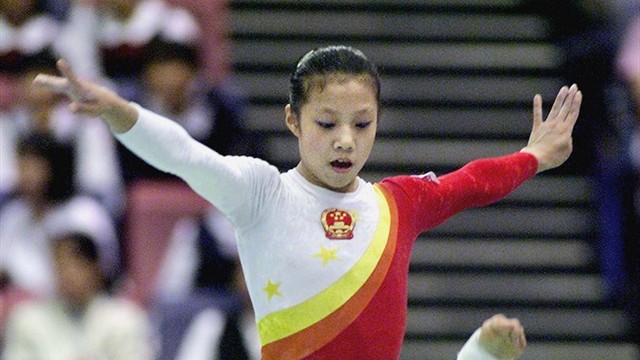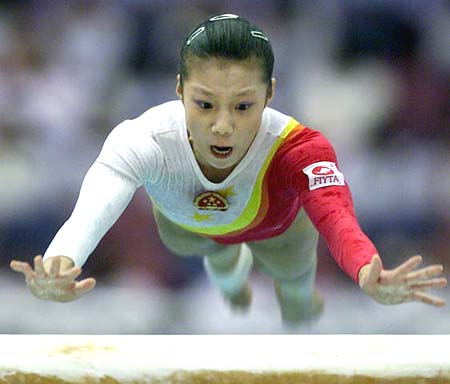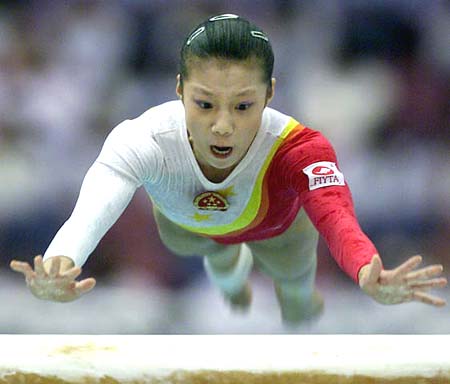Dong Fangxiao stripped of Olympic medal

The IOC Executive Board decided to withdraw and re-allocate accordingly the diplomas of the athlete with respect to the Women’s Individual Floor Exercises in which Dong Fangxiao placed sixth, and the Women’s Individual Vault in which she placed seventh.
The Board decided furthermore to withdraw and re-allocate accordingly the medals and diplomas of the Chinese Women’s Team in which Dong Fangxiao participated, namely the Women’s Team event in which the Team placed third.
The decisions come in response to a request submitted by the FIG to the IOC on February 27th by means of an Executive communiqué.
The sanction reflects the Chinese gymnast’s wilful falsification of her date of birth. After a lengthy investigation into the affair, the FIG ruled that there had been a violation of the Federation’s Statutes and Regulations. Consequently, the results obtained by Dong Fangxiao at the 2000 Sydney Olympic Games have been cancelled. In addition, the FIG Executive Committee pronounced the cancellation of all results obtained by Dong Fangxiao at the 34th Artistic Gymnastics World Championships 1999 in Tianjin, the Artistic Gymnastics World Cup Final 2000 in Glasgow (GBR) and all events counting for the FIG World Cup 1999-2000. The Chinese Gymnastics Association will be responsible for covering all court costs.
The FIG stands behind both the IOC’s decision and FIG President Prof. Bruno Grandi, who has once again reiterated his convictions. “Respecting the minimum age of our gymnasts remains a priority and I am committed to safeguarding the health of our athletes. I was very happy to hear the IOC’s decision, which is a full support of the FIG’s request and shows the IOC’s support in FIG fight for justice in sport.”
Chinese fans blamed China’s sports system for the ruling that stripped gymnast Dong Fangxiao of her Olympic bronze medal because she was only 14 when she competed. The women’s team bronze will now go to the US gymnastics team.
Chinese sports fans reacted with anger to the news that gymnast Dong Fangxiao had been stripped of her Olympic medal. But their ire was directed at the Chinese government, not the International Olympic Committee.
Cry for Dong Fangxiao, Victim of the Sports System” read the headline on today’s post by Li Jiayang, sports columnist on the popular Netease web portal.
“Competing for her local team in the Chinese National Games, she damaged her knee permanently, in order to win an Olympic medal for the national team, her age was hidden (I don’t dare to use the word ‘falsify’ which may cause trouble)” Mr. Li wrote, “and she has been humiliated. It’s enough to make you cry.”
On Wednesday, the IOC resolved a decade-old scandal with its decision to strip China of a gymnastics bronze medal from the Sydney Olympics for fielding an under-age gymnast.
The women’s team bronze will now go to the US team, following a finding that Dong Fangxiao was only 14 when she competed for China in Australia, two years younger than the minimum allowed.
China, where top athletes are selected and intensively trained from very young ages, has been accused several times of including under-age gymnasts in their world class teams, but this is the first time such accusations have been upheld by an international body.
Though rumors about Ms. Dong swirled among international gymnastics teams in Sydney, the issue attracted wider attention during the 2008 Beijing Olympics, when similar doubts were aired about several of the host team’s female athletes.
The International Gymnastics Federation (FIG), the body that governs international gymnastics, later accepted the results of an official Chinese investigation into the 2008 team. Using passports, ID cards, and family registration documents, Beijing convinced the FIG that none of the girls had been too young to compete in Beijing.
The FIG said, however, that it was not satisfied with “the explanations and evidence provided to date” about Dong’s eligibility in 2000, and nullified her results last February. Since Dong’s performance had contributed to the Chinese team’s success, all team members lost their medals due to Wednesday’s IOC decision.
Though Dong’s birthdate is registered in FIG records as Jan. 20th 1983 – the date that the Chinese gymnastics federation provided when she competed – her accreditation at the Beijing Olympics, where she worked as a national technical official, said she was born on Jan. 23rd 1986. That would have made her 14 in Sydney, two years younger than the minimum age of 16.
On her blog, Dong said that she had been born in the Year of the Ox, which ran from February 1985 to February 1986.
The FIG raised the minimum competition age from 14 to 15 in the 1980’s, to protect young and still developing athletes from serious injury. The IOC ordered the FIG to raise the age again, to 16, in 1997.



